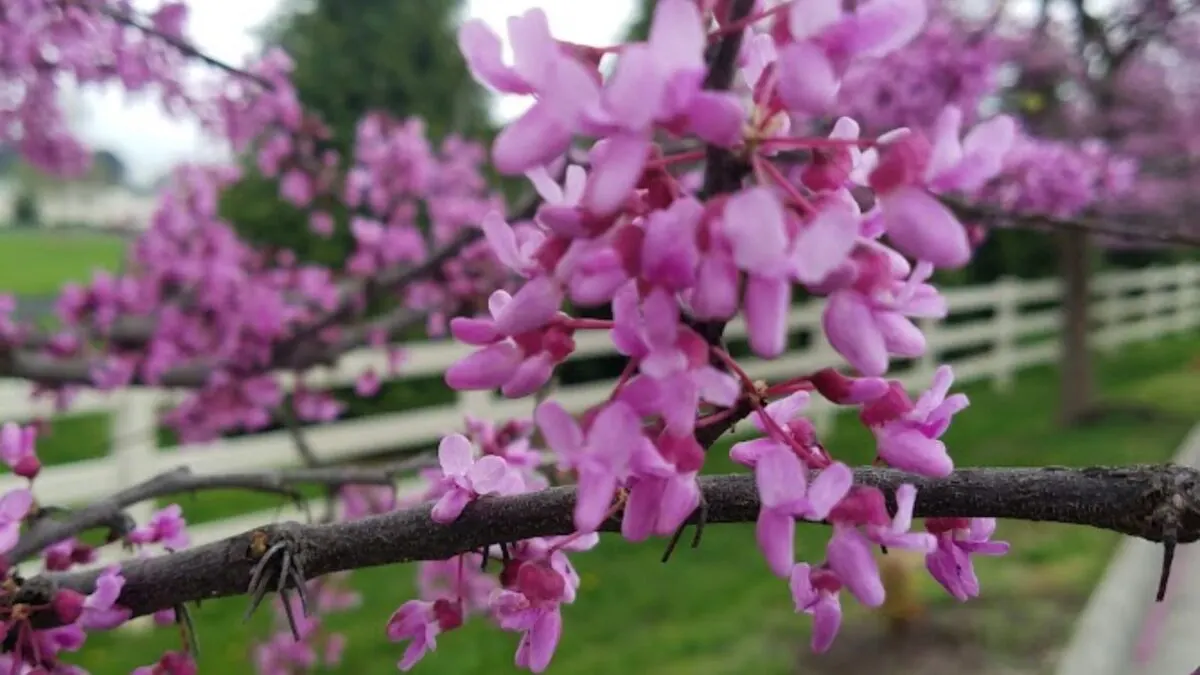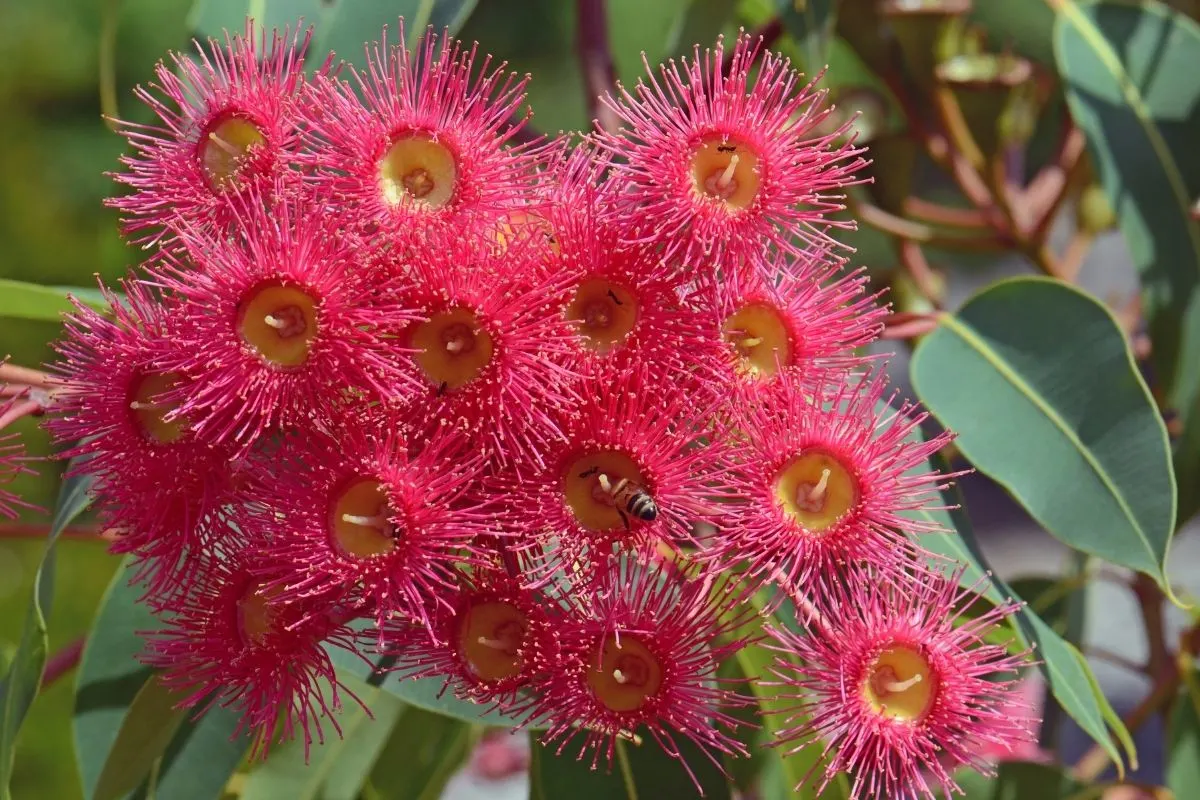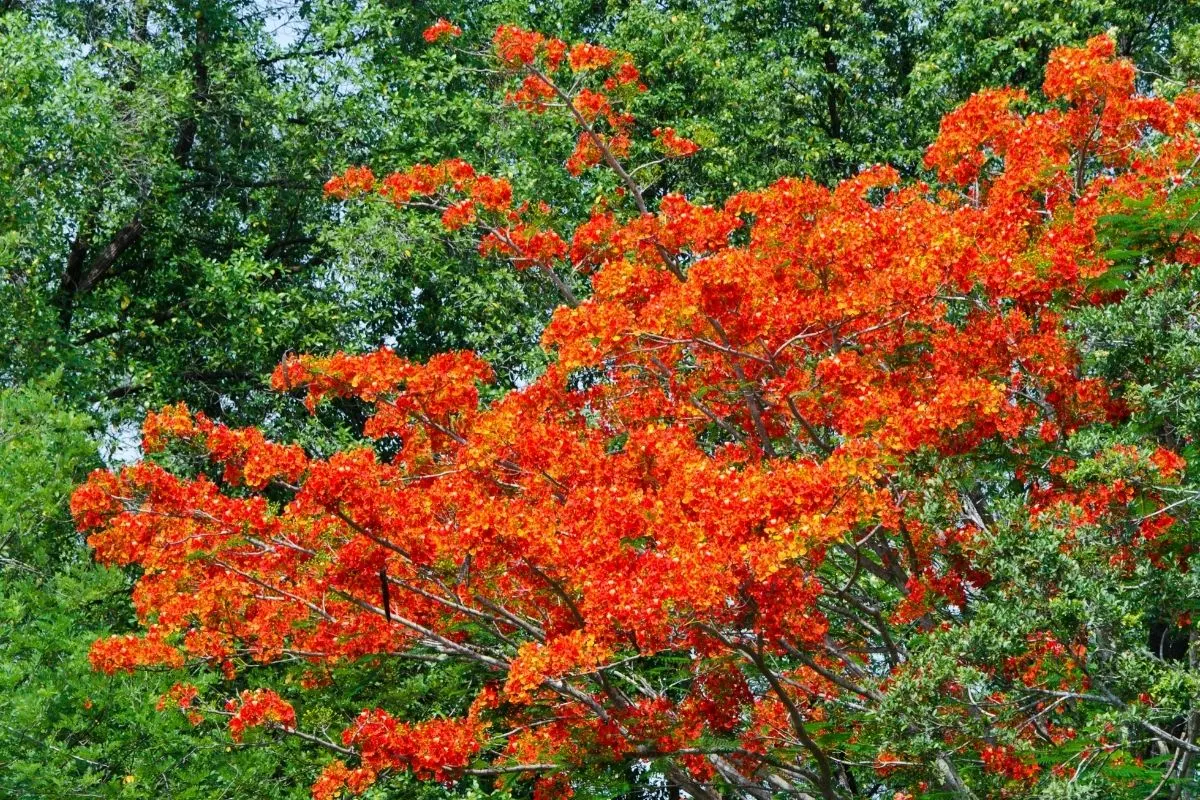Fast-growing flowering trees add beauty to your landscape, rewarding you with lovely blooms and towering stature in just a few years. Slower-growing flowering trees can add character to your garden, but if you are starting your garden from scratch and you don’t want to wait years for beautiful blooms, the faster growing flowering trees can give you a dramatic transformation.
Here are 10 of our favorites for landscape design in the United States.

1. Callistemon, also known as crimson bottle brush

A native of Australia, Callistemon complements seaside and Mediterranean garden designs. The red “brushes” that cover the plant are actually the stamens of its flowers. The petals are so inconspicuous that you have to look hard to find them. As you might expect, most flower heads of the crimson bottlebrush are crimson, but there are also occasional flower heads in orange, green, or yellow.
Check out these other red flowering trees.
Callistemon grows 30 feet (10 meters) tall as a specimen tree, but it can also be trained to become a container plant. Callistemons are favorite butterfly plants.
2. Crabapple

Crabapple is a variety of apple that bears copious blooms in early spring and small fruit that attract wildlife all summer. The real beauty of this tree is its fruit since the blooms fade in about a week, but the fruits remain on the tree all summer and through most of the fall. A constant supply of fruit makes the crabapple a favorite attraction of birds and squirrels.
Crabapples fit well in most cottage landscape designs. If given rich soil and summer moisture, they grow 2 or 3 feet (up to a meter) a year, quickly reaching their mature height to take their permanent place in the landscape.
3. Crape myrtle

The crape myrtle is an excellent choice if you want a fast-growing tree that provides bold color all summer long. Well adapted to summer heat, it does just as well under irrigation in the arid Southwestern United States as it does in the steamy Southeast,
Crape myrtles grow approximately 2 feet (60 cm) a year and come in a variety of colors. The beautiful dark pink Tuskegee variety (see more pink flowering trees) can be framed by the delightfully purple Muskogee crape myrtle of the bold white blooms of the Natchez cultivar.
Crape myrtles need fertilizer every month during the growing season to ensure lush foliage and abundant flowers. Prune during their dormant season to maintain their canopy shape. Crape myrtles are winter-hardy in USDA Hardiness Zones 6 through 9.
Crape myrtles are a great selection for front yards.
4. Eastern redbud

Eastern redbuds (Cercis canadensis) bloom in early spring when other flowering trees are bare. The most familiar cultivars of this tree are covered with pea-like blossoms in shades of lavender for a couple of weeks around the date of the last freeze, but there are also varieties of Eastern redbud that bloom in white or magenta.
Redbuds grow up to 2 feet (60 cm) per year. Happy growing under other deciduous trees, redbuds are adapted to sandy soils, clay soils, rocky soils, low pH, high pH, moist conditions (as long as they don’t stand in water), and drought. Redbuds are winter-hardy in USDA Hardiness Zones 4 through 9.
5. Kentucky wisteria

Kentucky wisteria is one of the best choices for a fast-growing tree for the front of your house. It creates waterfalls of beautiful blooms that fill the air with its perfume. The Kentucky wisteria is a favorite for growing over a pergola or up the side of your house. It is the perfect tree for a cottage front door.
Kentucky wisteria will grow two or three feet a year, sometimes more. It flowers two or three years after it is planted. Be sure to get Kentucky wisteria, not the more invasive and poisonous Chinese wisteria.
6. Kwanzan cherry

The Kwanzan cherry, which is officially known as Prunus serrulate Kwanzan, erupts in streams of frothy pink blooms in late spring. Because it blooms after other cherries, the Kwanzan cherry is a great choice for making sure you have your own “cherry blossom time” every spring, even when other cherries are set back by frost.
Kwanzan cherries grow 1 or 2 feet (30 to 60 cm) per year and can eventually reach a height and breadth of 40 feet (13 meters). Consistent pruning, however, can keep the Kwanzan cherry a smaller tree.
7. Linden tree, also known as Tilia

The delicate, bell-like yellow flowers of the Linden tree attract bees. The flowers taste like honey. Linden trees bloom in early summer when other sources of nectar and pollen have gone to seed. After its flowering season, the linden tree provides dense shade all summer.
Linden trees also have sweet leaves. They attract aphids, which may be “farmed” by ants that encourage them to bite into the leaves to release the sweet sap on which both insects feed.
Linden trees grow about 2 feet (60 cm) every year and can reach 50 to 80 feet (16 to 26 meters) tall. However, they don’t do well in areas with heavy air pollution.
8. Sargent cherry

Looking for a fast-growing flowering cherry tree that bears edible fruit? Look no further than the Sargent cherry. This Siberian import is covered with single pink flowers in the spring, followed by small black cherries in the summer. The cherries are delicious, but hard to find. Birds may compete with you for the bounty.
Sargent cherries are extremely hardy. They are easily transplanted and can withstand summer drought and, coming from Sakhalin Island in eastern Russia, winter cold. They make great street trees but do not do well in areas with heavy air pollution.
9. Southern magnolia

Different magnolias grow at very different rates. For instance, the lovely star magnolia (Magnolia stellate) grows just a few inches in its first year, so it grows slowly and is best treated as a container plant. On the other hand, the stately southern magnolia (Magnolia grandiflora) grows two feet yearly, reaching 30 to 45 feet (10 to 15 meters).
Southern magnolias are covered with white flowers from mid-spring to early summer, in most locations, through the month of May into early June. No magnolia will grow faster, making this variety a great focus plant.
10. Tulip tree

The tulip tree (Liriodendron tulipifera) is not related to tulips. Although its yellow and orange flowers look like tulips, they are easy to appreciate from a distance because they grow up to 4 inches (10 cm) in diameter.
Tulip trees grow up to 3 feet (a meter) every year. In a forest, where they compete with other trees for sunlight, they sometimes grow as much as 180 feet (60 meters) high. Their unusually straight habit makes them a great specimen tree – although it can take up to 15 years to see their first blooms.
Keep in mind that the trees that grow the fastest tend to have the shortest lives. Planting a mix of fast-growing and slow-growing flowering trees is the best way to ensure a lifetime of landscape beauty.
Frequently Asked Questions About Fast-Growing Flowering Trees
Are there any fast-growing flowering shade trees?
Ginkgos grow fast and produce a beautiful display of yellow blooms in the spring. These trees are especially well-suited to high-traffic areas and can withstand air pollution.
What are some good fast-growing evergreen flowering trees?
Mountain laurels are often found growing in dry, rocky, hot-summer locations, so we don’t think of them as fast-growing, but they grow 2 or even 3 feet a year in good soil with regular moisture. These evergreen plants put on gray seed pods after their blue and purple flowers fade in the spring.
Are Japanese maples the only flowering maples?
Silver maple puts on red blooms in the spring and yellow leaves in autumn. Red maple puts on red flowers in the spring and bright red leaves in the fall. Both maples grow about 30 feet (10 meters) high in 15 years or so.
Which dogwood grows fastest?
Red dogwood grows faster than other varieties. They will add at least 2 feet (60 cm) of height yearly.
Which fast-growing flowering tree makes the best privacy screen?
Even as young trees, red dogwood trees make great privacy screens. Although they only bloom for about a month in early spring, they make a great backdrop for your landscape all year round.
Here are 10 more ideas for creating privacy in your backyard.
Red flowering gum (Corymbia ficifolia) produces a show of red flowers for up to six months a year and hangs low enough to block casual viewing from the road or street. It is a subtropical tree, but new varieties do well even in cooler climates.

Royal poinciana (Delonix regia), also known by its common name, fire tree, won’t keep a determined viewer from seeing your yard. Still, its beautiful red flowers that last all summer will distract passersby from looking into your yard and home.

Are there any fast-growing flowering trees suitable for a small garden or patio?

Any fast-growing flowering tree grown in a container is suitable for a small garden. Consider a tree rose, tree peony, or double-blooming gardenia tree.
Is there a best time for planting fast-growing flowering trees?
People who live in tropical climates can plant fast-growing flowering trees any time of year if they are able to provide the young transplant with appropriate levels of moisture. In climates with short winters and not particularly frosty, planting fast-growing flowering trees in the fall gives them all winter to put down roots to capture summer moisture. In cold-winter climates, planting is usually delayed until early spring.
Conclusion
If you’re looking for the fastest growing trees for your yard, try one of the above. Here are a few more of my favorite fast-growing trees :
- willow trees (weeping willow trees can grow up to 10 feet a year when they’re young)
- red oak – it has beautiful bright red fall foliage and makes a great shade tree
- some pear trees, such as the oriental pear (Pyrus communis) and the Kieffer pear (Pyrus communis x P. pyrifolia) are fast growers
- some magnolia trees, such as the southern magnolia, grow up to 2 feet per year
- flowering cherry trees with their fragrant white flowers (and pink flowers) are another good choice and can create a beautiful focal point in your front yard
- the heritage river birch (Betula nigra) grows medium-fast, between one and two feet per year
These trees, while beautiful, don’t enjoy rapid growth:
- bald cypress
- dogwood trees
- Japanese maple
- paperback maple
You don’t have to wait years or decades to see a tree you’ve planted bloom. The trees we discussed here will grow quickly, giving you a gorgeous landscape without waiting too long. I hope you found the perfect tree for your backyard 🙂

10 Types Of Flowering Trees For A Beautiful Yard
Tuesday 6th of December 2022
[…] our fast-growing flowering trees page for more information and […]